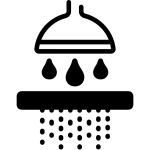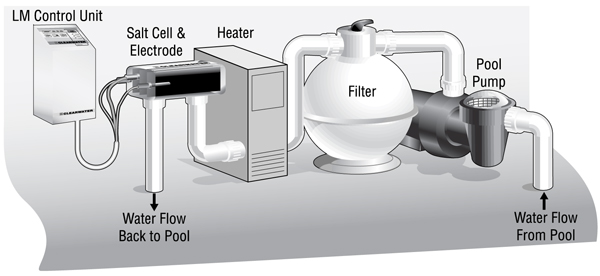Are you dreaming of crystal-clear pool water that’s easier to maintain and gentler on your skin? Welcome to the world of salt water pool filters — a game-changer for homeowners and pool enthusiasts who want a healthier and more enjoyable swimming experience. In this comprehensive guide, we’ll explore everything you need to know about salt water pool filters, including how they work, their benefits, maintenance tips, and how they compare with traditional chlorine systems.
Whether you’re building a new pool or upgrading your existing one, Cuoll is here to help you find the best water treatment solutions, from salt water pool filters to home water filters, purifiers, and even bathtubs that complement your clean lifestyle.
Table of Contents
- What Is a Salt Water Pool Filter?
- How Does a Salt Water Pool System Work?
- Salt Water Pool Filter vs. Traditional Chlorine System
- Key Benefits of Salt Water Pool Filters
- Choosing the Best Salt Water Pool Filter for Your Pool
- How to Maintain a Salt Water Pool Filter
- Common Myths About Salt Water Pools
- Environmental Benefits of Salt Water Pool Filtration
- Cuoll’s Recommendations: Top Water Treatment Products
- Final Thoughts
1. What Is a Salt Water Pool Filter?
A salt water pool filter is a key component of a saltwater pool system that helps purify your pool water by removing dirt, debris, and other contaminants. While many people confuse the salt water pool system with the filtration system, it’s important to note that the filter’s job is to clean the water physically, while the salt chlorine generator produces chlorine from salt to sanitize the water.
In simpler terms:
- The salt water pool system uses electrolysis to convert salt into chlorine.
- The pool filter removes particles, dirt, and debris from the water.
Types of Salt Water Pool Filters
There are three main types of filters used in saltwater pools:
- Sand Filters: Cost-effective and easy to maintain.
- Cartridge Filters: Energy-efficient and offer finer filtration.
- Diatomaceous Earth (DE) Filters: High-end option with superior filtration.
2. How Does a Salt Water Pool System Work?
The process begins when you add pool-grade salt to the water. As water passes through the salt chlorine generator, it undergoes electrolysis — converting salt (sodium chloride) into hypochlorous acid, the active form of chlorine.
The Process in Simple Steps:
- Add salt to your pool water (usually 3,000–3,500 ppm).
- The salt dissolves and stays in the water.
- The salt chlorine generator produces chlorine via electrolysis.
- Chlorine sanitizes the pool water.
- The salt regenerates and repeats the process.
While the salt water pool filter doesn’t produce chlorine, it plays an essential role in keeping the water clean and free of impurities — making it work in harmony with the salt system.
3. Salt Water Pool Filter vs. Traditional Chlorine System
Many pool owners wonder whether switching to salt water is worth it. Here’s a quick comparison:
| Feature | Salt Water Pool | Traditional Chlorine Pool |
|---|---|---|
| Chlorine Source | Generated from salt | Manually added |
| Water Feel | Softer, less irritating | Can be harsh on skin and eyes |
| Maintenance | Lower in the long term | Frequent chemical adjustments |
| Smell | Minimal | Strong chlorine odor |
| Cost | Higher upfront, lower maintenance | Lower initial cost, higher long-term cost |
If you value comfort, easier maintenance, and a more natural feel, salt water pool filters and systems are clearly the better choice.
4. Key Benefits of Salt Water Pool Filters
Let’s dive deeper into why a salt water pool filter is a smart investment:
1. Healthier for Skin and Eyes
Salt water is gentler on your body. No more red eyes, itchy skin, or chlorine rashes after a swim.
2. Low Maintenance
Say goodbye to buying and storing chlorine tablets. With proper setup, salt water pools need less manual intervention.
3. Cost-Effective Over Time
Although the upfront cost may be higher, you save money on chemicals, maintenance, and repairs over the years.
4. Eco-Friendly
Fewer harsh chemicals mean less environmental pollution — a huge plus for eco-conscious homeowners.
5. Smooth Swimming Experience
The soft feel of salt water is more pleasant and luxurious — like bathing in a natural spring.
5. Choosing the Best Salt Water Pool Filter for Your Pool
When selecting a salt water pool filter, consider the following factors:
1. Pool Size
Choose a filter system rated for your pool’s volume. A filter too small will overwork and fail to clean properly.
2. Filter Type
- Sand Filters: Affordable, but may not capture finer particles.
- Cartridge Filters: Best balance of price and efficiency.
- DE Filters: Premium option with ultra-fine filtration.
3. Material Durability
Since salt water can be corrosive, ensure the filter system is made from salt-resistant materials.
4. Ease of Maintenance
Look for models with simple cleaning or backwashing systems.
Pro Tip from Cuoll: Pair your pool filter with a high-quality whole-house water filter or water purifier from our store to maintain a consistent clean water experience throughout your home.
6. How to Maintain a Salt Water Pool Filter
Regular maintenance ensures longevity and optimal performance. Here are basic tips:
Weekly:
- Check water chemistry: pH, chlorine, salt level.
- Inspect for visible debris and clean skimmer baskets.
Monthly:
- Inspect the salt cell for buildup or scale.
- Clean the filter cartridge or backwash sand filters.
Quarterly:
- Test for calcium hardness and stabilizer levels.
- Deep clean the filter system.
Annually:
- Replace old cartridges if worn.
- Inspect and service the salt chlorine generator.
Need supplies? Cuoll offers cleaning kits, filter replacement cartridges, and test strips to make your job easier.
7. Common Myths About Salt Water Pools
Let’s clear up a few common misconceptions:
Myth #1: Salt Water Pools Are Chlorine-Free
Truth: They still use chlorine — it’s just generated from salt and is usually lower in concentration.
Myth #2: Salt Water Pools Taste Salty
Truth: The salt level is similar to human tears — barely noticeable.
Myth #3: Salt Water Damages Pool Equipment
Truth: Modern equipment is designed to withstand salt, especially when maintained properly.
8. Environmental Benefits of Salt Water Pool Filtration
Salt water pool systems aren’t just good for you — they’re good for the planet.
- Reduced chemical runoff: Traditional chlorine can harm plants and animals if not disposed of properly.
- Less packaging waste: No more chlorine tubs and plastic containers.
- Lower energy use: Cartridge filters, often used with salt systems, consume less energy.
If sustainability matters to you, Cuoll offers eco-friendly home water filters and low-flow bathtubs to complement your green lifestyle.
9. Cuoll’s Recommendations: Top Water Treatment Products
While you’re upgrading your pool system, why not elevate your entire water experience? At Cuoll, we offer a curated range of products designed to provide clean, safe, and luxurious water:
✅ Salt Water Pool Filters
Efficient, corrosion-resistant, and built for long-term use.
✅ Whole-House Water Filtration Systems
Ensure your entire home enjoys contaminant-free water.
✅ Under-Sink Water Purifiers
Perfect for drinking, cooking, and healthier hydration.
✅ Luxurious Bathtubs
Made with hygienic, easy-to-clean surfaces — ideal for salt soak sessions.
Explore our full catalog at Cuoll.com and bring home the comfort of clean water.
10. Final Thoughts
Switching to a salt water pool filter is more than just a trend — it’s a lifestyle upgrade. With softer water, reduced maintenance, and long-term savings, it’s no wonder more homeowners are making the change.
Whether you’re revamping your pool or just getting started, Cuoll is your trusted partner in water treatment solutions — from the pool to your kitchen and bathroom. Our products are designed to help you live cleaner, healthier, and more comfortably.
Ready to make the switch?
Explore our best salt water pool filters and enjoy cleaner water today.








